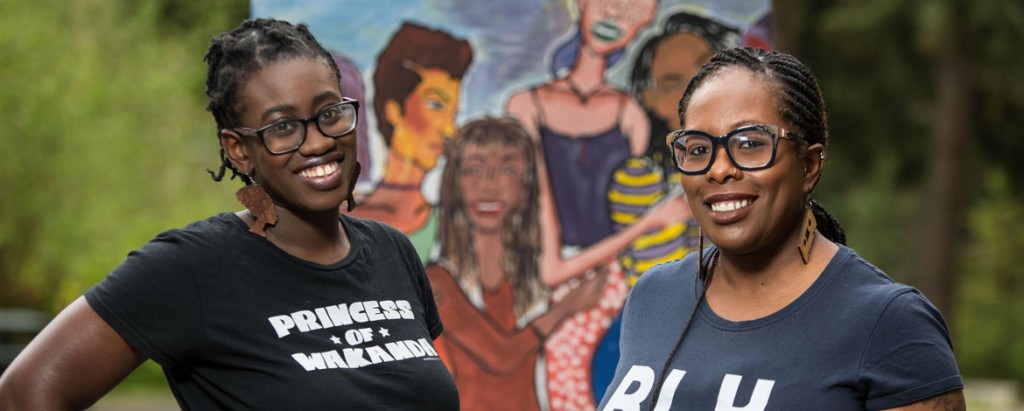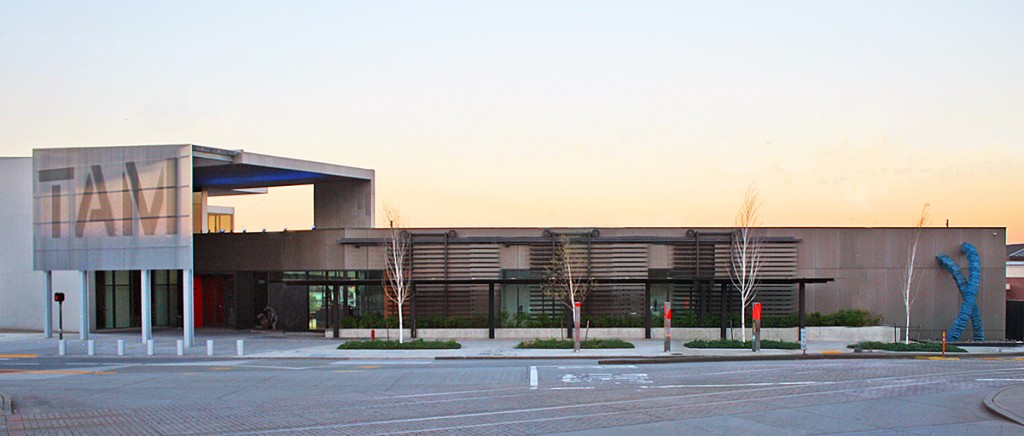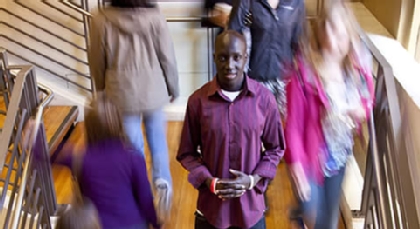Page 34 • (345 results in 0.117 seconds)
-

PLU Student-Faculty Research on Health Care and High Technology A conversation with 2016 Benson fellows Marc Vetter and Matthew Macfarlane The following excerpts were gathered from a May 26, 2017 conversation between Benson Family Chair Michael Halvorson and the 2016 Benson research fellows Marc Vetter…
software. U.S. consumers were seeing products that they had never seen before. Productivity applications like spreadsheets and word processors really changed what people could do with computers, and to study the origins of the movement I looked at how companies like Lotus 1-2-3, WordPerfect, and Microsoft contributed to the U.S. economy.” Michael: “How did this competitive marketplace take shape, Matt? Weren’t Bill Gates and Steve Jobs in a battle-to-the-death over these new software products?” Matt
-

TACOMA, WASH. (Feb. 4, 2016)- Kamari Sharpley-Ragin reluctantly admits that he used to joke about racism. The ninth-grader from Lincoln High School in Tacoma says it didn’t seem like a big deal, since he never really experienced overt discrimination himself. Now, he says he knows…
. “I think the high school students have a lot to teach the college students,” she said. Fellow teaching assistant Quenessa Long, a sophomore anthropology and political science major, agreed. “It’s not a top-down mentality,” Long said. “We’re definitely in a privileged position that these students aren’t in. It is definitely humbling.” Courtney Gould said the course pushed students to apply what they learned in a very intentional way. “We were hoping that there would be a lot of learning back and
-

TACOMA, WASH. (May 2, 2018) — Tolu Taiwo and Angie Hambrick know all about wearing natural hair in predominantly white spaces. “Hair is a really important piece of our culture and who we are, and it’s an interesting piece to navigate when you’re also at…
2016, they crafted a research paper examining those experiences, which are often marginalized at in higher education. It focused on how black students navigate the natural hair journeys on campuses in the Pacific Northwest. Taiwo and Hambrick jumped at the opportunity to write the paper after learning of a political science journal accepting submissions on the theme of #BlackGirlMagic, a movement created in 2013 by CaShawn Thompson to celebrate black women. Tolu Taiwo (left), outreach and
-

TACOMA, WASH. (April 6, 2016)- Travel from the shores of Puget Sound to the fjords of Norway with the exhibition Edvard Munch and the Sea , on view exclusively at Tacoma Art Museum April 9 through July 17, 2016. This is your opportunity to dive…
images with many layers of meaning,” Bullock elaborated. “Neutralia for example isn’t just two women happily picking apples in the springtime. It is about joy in nature, but it is more importantly a political statement. There is a boat in the background being overwhelmed by waves, a ship going down, which represents Europe. He’s telling us that he was not happy that Norway remained neutral in World War I, going on with daily life, while the rest of Europe was struggling.” In 2012, Munch’s famous 1895
-
Originally Published 1999 “The Artist, the thinker, the hero, the saint —who are they, finally, but the finite self radicalized and intensified? . . . The difference between [them] and the rest of us . . . is a willingness to undergo the journey of…
the kind of knowing that cannot be unknown. For our students this is a process of reconstituting themselves as human beings, a process of disintegration and reintegration, for some welcome, for others not. For all, however, it is a process that usually involves their experiencing a sense of tension and even betrayal of family, peer group, social class, ethnic community, religious denomination, or political ideology. Whether and how students negotiate this process depends on many things: among them
-
Gaslighting is the through line and ultimate source of tension in season two of Sanditon . This psychological manipulation is present in Captain Lennox’s abuse of Mr. Parker’s trust and the financial entrapment that threatens to sap Sanditon dry, one more in a series of…
if Clara had the recourse we need to fight to keep, the plot may have progressed in a different way. But, we still have something to apply to our present given how the allyship between Clara and Esther as well as Georgiana and those supporting the strike is exactly what we need against political powers determined to isolate and to weaken. Because if we start to doubt, name-call, or diminish each other as a means of virtue signaling or for any other perceived reward, as so often happens online, we
-

Lost Boy of Sudan By Chris Albert The table in David Akuien’s South Hall apartment is covered with textbooks and worksheets, filled with meticulous notes. He sits down at the table and spends hours studying – this day it’s for an environmental studies test. David…
Lutheran University. This May, Akuien (pronounced “A – Q – En”) will graduate with a double major in communication and political science with minors in conflict resolution and religion. The first years of his life were spent traveling, or rather escaping from the horrors of a civil war in Sudan. “I was born into this chaos right away,” Akuien said. He is one of almost 4,000 “Lost Boys,” who escaped a life of war and faced the fear of the unknown for a chance at a better life in America. “Luckily, I was
-

In recognition of the 500th anniversary of the Lutheran reformation, throughout the 2016-17 academic year a wide range of academic, community and artistic events at Pacific Lutheran University will address questions and concepts relating to Re•forming. UPCOMING EVENTS Second Annual César Chávez & Dolores Huerta…
political season marked by the demonization of racial, religious, and ethnic minorities, this conference focuses on the quest for a just vision of life shared in community. Sponsored by the Department of Religion and Lutheran Studies program. MORE INFORMATION Ruth Anderson Public Debate: A Third-Party Vote is a Wasted Vote Oct. 4 | 7 p.m. | Karen Hille Phillips Center for the Performing Arts The 4th annual Ruth Anderson Public Debate will feature PLU debaters Mariah Collier ‘17 and Charles “Tate” Adams
-
A year of achievement and a Decade of Change Dear Colleagues and Friends, It is a great joy for me to welcome each of you to University Fall Conference as we prepare to launch the 2010-2011 academic year, the 121st year in the life of…
financial aid office came in on budget last year, achieved a clean audit, and now has transitioned all student lending to the Federal Direct Loan Program. At the same time, they, like our business office, have adjusted to operate under another new wave of government regulations. Student Services both supported countless students and families as they navigated the new economy and as they implemented new bill paying and transcript request programs to more effectively serve every student and family
-
TACOMA, Wash. (May 22, 2015)— With Commencement on May 23, Pacific Lutheran University sends its largest class ever out into the world—more than 800 Lutes are eligible to graduate, with 755 expected to participate in the Commencement ceremony. Judging by the accomplishments of the Class…
: Anthropology and Religion, minor in Political Science. Hometown: Helena, Montana. PLU Accomplishments: Peace Scholar, Pinnacle Society member, ASPLU Programs Director, Montana Club President, Campus Ministry Steward, Brian C. Olson Alumni Award, Lute Talks Presenter, Gonyea Fellow, Leadership Board and Tour Guide for Admissions, and Religion Tutor. Favorite PLU memory: “Earlier this spring, the award-winning director Jehane Noujaim came and spoke about her film The Square and the role media play in
Do you have any feedback for us? If so, feel free to use our Feedback Form.


